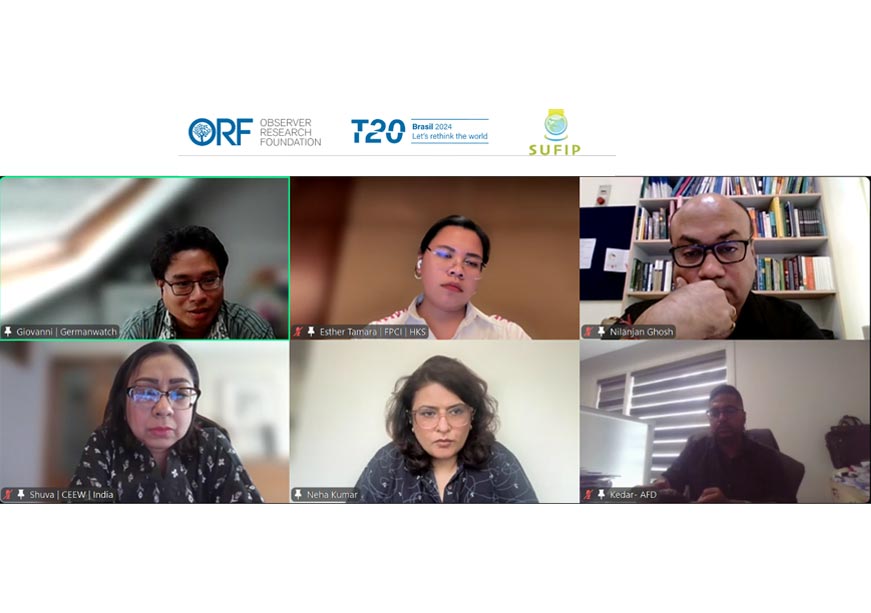-
CENTRES
Progammes & Centres
Location

The Indo-Pacific stands at the forefront of climate change, grappling with a myriad of environmental challenges exacerbated by its heavy reliance on fossil fuels. This dependence is not only critical to its economic growth but also contributes significantly to global carbon emissions, with the region alone accounting for 16.75 billion tonnes of carbon dioxide. As it consumes a quarter of the world’s energy—a figure projected to rise to almost half by 2050—the urgency of transitioning to affordable and clean energy is paramount. This transition is also vital for sustaining economic momentum and meeting the Sustainable Development Goals (SDGs).
In this context, the Sustainable Finance in the Indo-Pacific (SUFIP) Development Network (DN) organised a virtual side event as part of T20 Brazil titled “Catalysing Finance: Accelerating the Indo-Pacific Energy Transition” on August 16, 2024. The panel was moderated by Nilanjan Ghosh, Director, ORF Kolkata and Centre for New Economic Diplomacy (CNED). The panel featured Shuva Raha, Head - New Initiatives, Council for Energy, Environment and Water, India; Esther Tamara, Director of Climate Unit, Co-Director of Research and Analysis, Foreign Policy Community of Indonesia (FPCI); Neha Kumar, Head, South Asia Programme, Climate Bond Initiative (CBI); Kedar Sawant, Senior Portfolio Manager – Energy Transition, Agence Française de Développement (AFD); and Giovanni Maurice Pradipta, Policy Advisor, Germanwatch.
The panel began with insights from Shuva Raha, Head, New Initiatives, CEEW, who explained how linkages between Public-Private Partnership model and international cooperation can attract investments in renewable energy. She cautioned against a one-size-fits-all strategy for energy transition since the countries in this region are heterogeneous in nature. She also pointed out that several countries lack defined financing requirements for energy transition which eventually leads to an ad hoc financing. Shuva also outlined the need to focus beyond mitigation and adaptation to include infrastructure resilience and governance. She highlighted two case studies—Ujjwala Yojana and PM Kusum Yojana in India— which, though are not considered as traditional energy transition projects, can be presented as a good example of integrating energy strategies with socio-economic conditions.
Esther Tamara, Director of Climate Unit, Co-Director of Research and Analysis, FCPI, delved into the dual challenge of growth and climate change threats faced by the developing nations. She emphasised that although ASEAN’s green taxonomy represents continuous efforts to harmonise green finance among member states, actual implementation varies widely due to differing priorities. Additionally, investor’s confidence is further undermined by inconsistent signals from governments. In order to attract private investments, Esther underlined the necessity of stronger regulatory frameworks and precise risk assessments. She also stressed on the importance of partnerships among governments, the private sector and philanthropic organizations which will scale up private financing and thus foster effective partnership.
Neha Kumar, Head, South Asia Programme, CBI highlighted the potential for greening economies, with a shift towards lowering emissions and boosting productivity without sacrificing well-being. However, she emphasised the need for a “green plus plus” approach integrating other aspects beyond just technology and green bonds. She also addressed the challenge of debt sustainability in this region due to high interest rates and stressed the importance of the capital market. Finally, she highlighted the role of local bond markets and national development banks in promoting financial flows.
Kedar Sawant, Senior Portfolio Manager – Energy Transition, AFD, highlighted the importance of bilateral development banks like AFD which allocate a sizable amount of France's GDP to industries like energy and environment-friendly transportation. He mentioned that high-risk projects like distributed generation with battery storage and novel renewable energy technologies are among the high-risk projects that AFD supports. To improve funding for these projects, he emphasised the significance of demand aggregation and regional cooperation. Kedar also emphasised how important it is for bilateral and multilateral institutions to develop payment security mechanisms, support policy-based loans and offer technical assistance to strengthen institutions. To enhance concessional financing and reduce transaction costs he emphasised the importance of financial innovations and charitable funding.
Giovanni Maurice Pradipta, Policy Advisor, Germanwatch underlined the difficulties faced by the Indo-Pacific civil society organisations in addressing energy transition with their traditional focus on democracy and human rights. He emphasised that the disconnection between advanced technological solutions and the basic energy needs of the local people leads to scepticism about new initiatives. Giovanni called for a more inclusive approach towards energy transition. He emphasised the necessity of funding for socioeconomic impacts rather than just technology. He also emphasised the value of ongoing communication that goes beyond short-term initiatives.
The event underscored several key strategies that can advance Indo-Pacific’s energy transition: customising financial approaches to regional needs, strengthening regulatory frameworks to boost investor confidence, adopting inclusive financial models that integrate socio-economic factors, and leveraging innovative financing mechanisms. The success of this transition will rely on strategic investments, effective partnerships, and a commitment to addressing both technological and socio-economic dimensions. By aligning these efforts with the region’s diverse contexts and fostering collaborative action, the Indo-Pacific can achieve a sustainable and resilient energy future, turning ambitious goals into tangible progress.
This event report is prepared by Srishti Bhadra, Intern, ORF Kolkata
The views expressed above belong to the author(s). ORF research and analyses now available on Telegram! Click here to access our curated content — blogs, longforms and interviews.